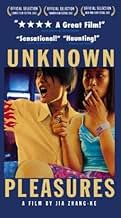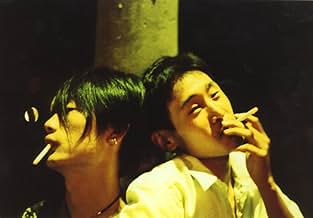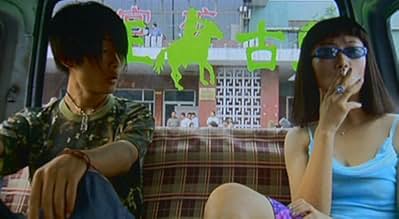CALIFICACIÓN DE IMDb
6.8/10
2.7 k
TU CALIFICACIÓN
Agrega una trama en tu idiomaTwo unemployed Chinese teenagers have trouble resisting the temptations of the Western world.Two unemployed Chinese teenagers have trouble resisting the temptations of the Western world.Two unemployed Chinese teenagers have trouble resisting the temptations of the Western world.
- Dirección
- Guionista
- Elenco
- Premios
- 2 premios ganados y 5 nominaciones en total
Limin Wang
- The Karaoke Customer
- (as Wang Li Min)
Juan Antonio Samaranch
- Self
- (material de archivo)
- (sin créditos)
Jia Zhang-ke
- Man singing in street
- (sin créditos)
- Dirección
- Guionista
- Todo el elenco y el equipo
- Producción, taquilla y más en IMDbPro
Opiniones destacadas
There isn't an ounce of joy or spark in these characters, who I'm pretty sure don't crack a single smile throughout the film. They manage to smoke a million cigarettes though. Not that there's anything to smile about, and that's the point. There is no beauty anywhere, nor is there hope. The landscape is a wasteland, the buildings are ugly or in ruins, and jobs are few. One says there is no future, and the other says that 30 years is plenty for a lifetime. Even when they're alone with women, they look forlornly off to the side or curl up in the fetal position.
This is a heavy neorealist type of film, reflecting poor parts of China that were still attempting to modernize in this time period. Who knows, as China's economic strength has continued to rise, maybe this film is already looked upon as quaint, or will be soon. American cultural references (e.g. Pulp Fiction) are known by the characters in the film, but it's from a distance, and things like the modern dance moves that have been picked up seem pretty tepid. Meanwhile, a single American dollar is viewed as quite a find, and a can of Coke is a treat. It certainly reminded me of the blessings in my life.
The scene that was most powerful for me was when the young woman who sings and dances (Zhao Tao) is trying to leave her boyfriend's company. Again and again she gets up and tries to exit, and again and again he pushes her back into her seat, and it seems such a perfect metaphor for the cycle of abuse in these kinds of relationships. Later we see he's also given her a black eye.
Given the dreary view the film shows of China, and the nihilistic attitude it takes towards the future, it was a little surprising to me that it wasn't censored more by the government. We see the power of the State on small television sets cracking down on the Falun Gong, what seems like a forced confession, and in real life when a policeman tells one of the guys that the punishment for robbing a bank is death. There is a lottery in place that may be a way of instilling a larger hope in people's minds than the infinitesimal chance of winning would justify, perhaps not unlike American lotteries. There is also a new highway project being built and great fanfare when Beijing is announced as the home of the 2008 Olympics. I guess all of these things can be viewed as in keeping with the government's interests, but in light of all the shabby surroundings and the dismal future these two guys have, they seem pretty sorrowful.
The film is meaningful and I admire director Jia Zhangke for having worked in an underground, indie type manner to produce a view of honesty and truth. I didn't rate the film higher because it's so depressing that I wouldn't want to look for it again anytime soon.
This is a heavy neorealist type of film, reflecting poor parts of China that were still attempting to modernize in this time period. Who knows, as China's economic strength has continued to rise, maybe this film is already looked upon as quaint, or will be soon. American cultural references (e.g. Pulp Fiction) are known by the characters in the film, but it's from a distance, and things like the modern dance moves that have been picked up seem pretty tepid. Meanwhile, a single American dollar is viewed as quite a find, and a can of Coke is a treat. It certainly reminded me of the blessings in my life.
The scene that was most powerful for me was when the young woman who sings and dances (Zhao Tao) is trying to leave her boyfriend's company. Again and again she gets up and tries to exit, and again and again he pushes her back into her seat, and it seems such a perfect metaphor for the cycle of abuse in these kinds of relationships. Later we see he's also given her a black eye.
Given the dreary view the film shows of China, and the nihilistic attitude it takes towards the future, it was a little surprising to me that it wasn't censored more by the government. We see the power of the State on small television sets cracking down on the Falun Gong, what seems like a forced confession, and in real life when a policeman tells one of the guys that the punishment for robbing a bank is death. There is a lottery in place that may be a way of instilling a larger hope in people's minds than the infinitesimal chance of winning would justify, perhaps not unlike American lotteries. There is also a new highway project being built and great fanfare when Beijing is announced as the home of the 2008 Olympics. I guess all of these things can be viewed as in keeping with the government's interests, but in light of all the shabby surroundings and the dismal future these two guys have, they seem pretty sorrowful.
The film is meaningful and I admire director Jia Zhangke for having worked in an underground, indie type manner to produce a view of honesty and truth. I didn't rate the film higher because it's so depressing that I wouldn't want to look for it again anytime soon.
Unknown Pleasures portrays Bin Bin and Xiao Ji, two young Chinese men living in the city of Datong, several hundred miles west of Beijing. Theirs is a city in transition; crowded streets and apartment blocks back onto building sites, weird landscapes of debris and raw materials. The growing commercialisation of Chinese society is readily apparent; in an early scene the duo attend a lurid road show promotion for alcoholic drinks. The television news that punctuates the film shows the changes and conflicts in China and the effect these are having across the world, from the controversial US spy plane crash to the award of the Olympic games for 2008.
The two young protagonists are outsiders in their changing city. Bin Bin, newly unemployed, lives with his mother. Unwilling then unable to find new employment, he becomes increasingly despondent. His relationship with his girlfriend, Yuan Yuan, is lived out in front of a television screen: they rarely make eye contact. The cultural void in his life feels remarkably Western. Xiao Ji works for his father's garage business. Whilst Bin Bin becomes increasingly downcast, Xiao Ji dreamily pursues Xiao Wu, a dancer with the aforementioned road show, risking the anger of her volatile boyfriend.
The overlapping stories of the two friends develop a common theme of loneliness and yearning on the fringes of a rapidly changing society. The sense of despair and malaise in their lives is powerfully conveyed, but the increasing aimlessness of their activities makes for slow and often difficult viewing. The final third of the film is particularly slow, with many drawn-out scenes. Despite this slackening of the pace, an unexpected twist at the end rams home the film's message that, along with the new freedoms in China, there is disenchantment with the new shape of society.
The two young protagonists are outsiders in their changing city. Bin Bin, newly unemployed, lives with his mother. Unwilling then unable to find new employment, he becomes increasingly despondent. His relationship with his girlfriend, Yuan Yuan, is lived out in front of a television screen: they rarely make eye contact. The cultural void in his life feels remarkably Western. Xiao Ji works for his father's garage business. Whilst Bin Bin becomes increasingly downcast, Xiao Ji dreamily pursues Xiao Wu, a dancer with the aforementioned road show, risking the anger of her volatile boyfriend.
The overlapping stories of the two friends develop a common theme of loneliness and yearning on the fringes of a rapidly changing society. The sense of despair and malaise in their lives is powerfully conveyed, but the increasing aimlessness of their activities makes for slow and often difficult viewing. The final third of the film is particularly slow, with many drawn-out scenes. Despite this slackening of the pace, an unexpected twist at the end rams home the film's message that, along with the new freedoms in China, there is disenchantment with the new shape of society.
I saw this film at the IFP LA Film Festival on June 16, 2003. It started out pretty well, but became aimless and sort of meandered. I couldn't root for any of the characters. The background of economically depressed mainland China is interesting, but only for a while. After half an hour, I wanted characters I cared about, but this movie didn't have any. It's not that the young actors weren't talented, it's just that the script was anti-climatic and didn't leave me wanting more, I just wanted the movie to end.
The story begins with an outline of the mundaneness of the lives and future of two Chinese youths, and progresses into showing in a short amount of time just how much their lives and personal situations change; dealing with unemployment, troublesome love lives and coming into their own a beautiful story unfolds.
With allusions to the film Pulp Fiction throughout and a recurring song that touches the heart, with solid performances by all of the actors (especially Zhao Tao) it was a very good film. My only criticism is at times the story can be slow, though overall the story is far more interesting than one sees in normal cinema.
The film was particularly strong in the simplistic nature of the film-making itself, with nothing ever over-the-top. It aimed to tell the situation as how it really is, and to tell life like how it really is, not some sort of Hollywoodized conception of life. The artistic reflection that was put into the film shows a great and amazing depth to it that is often hard to find.
Overall, a great film my Jia Zhang-ke. The feelings of hopelessness that he is able to make oneself feel make this a must-see for anyone who enjoys sad cinema and existentialism, and is interested in the struggles of youth and issues of modernization and globalization.
With allusions to the film Pulp Fiction throughout and a recurring song that touches the heart, with solid performances by all of the actors (especially Zhao Tao) it was a very good film. My only criticism is at times the story can be slow, though overall the story is far more interesting than one sees in normal cinema.
The film was particularly strong in the simplistic nature of the film-making itself, with nothing ever over-the-top. It aimed to tell the situation as how it really is, and to tell life like how it really is, not some sort of Hollywoodized conception of life. The artistic reflection that was put into the film shows a great and amazing depth to it that is often hard to find.
Overall, a great film my Jia Zhang-ke. The feelings of hopelessness that he is able to make oneself feel make this a must-see for anyone who enjoys sad cinema and existentialism, and is interested in the struggles of youth and issues of modernization and globalization.
Unknown Pleasures is the first Jia Zhang Ke film that I have seen and it is excellent. The setting is a town in the north of China, but it could be anywhere in the developing world - India, Argentina or South Africa, for example - where neo liberal economic policies have benefitted the urban elite, but created dislocation for millions of others. The director undoubtedly has a deep social conscience.
The film focuses on several young people, members of China's "new new" generation. As the films progresses, we see what the new world order offers them - US currency, American pop culture, the 2008 Olympics, new super highways - contrasted with the reality - few opportunities for young people, laid off state factory workers and a general degradation of moral values. The message is clear: the new world order offers common people everything in return for giving up traditional ways of life, but actually delivers little of substance. As Bin Bin puts it when he finds out that his girlfriend is going to Beijing to study international trade: "WTO is nothing. Just a trick to make some cash."
The social realist style - it has a bit of a documentary look to it - and the pop song which the film is named after and which features prominently in it (Ren Xiao Yao - the lyrics speak about youth alienation, particularly a desire for freedom and pleasure) also provide a cutting edge look and feel. The song is emotive and will strike a chord with those who like explorations of youth alienation.
However, the film, as befits the political and artistic climate in China, is very subtle and understated, and may escape those who have little knowledge of current affairs in China or an insensitivity to the economic and social dislocation that is taking place outside the big cities (this is not a good date movie for the corporate Western expat and his urban Chinese girlfriend who measure progress by the number of new condos and Western restaurants in Shanghai).
This is great indie filmmaking, though, and I would particularly recommend it to socially and politically aware twenty and thirtysomethings who like artistic expression that is intelligent, socially conscientious and cutting edge.
The film focuses on several young people, members of China's "new new" generation. As the films progresses, we see what the new world order offers them - US currency, American pop culture, the 2008 Olympics, new super highways - contrasted with the reality - few opportunities for young people, laid off state factory workers and a general degradation of moral values. The message is clear: the new world order offers common people everything in return for giving up traditional ways of life, but actually delivers little of substance. As Bin Bin puts it when he finds out that his girlfriend is going to Beijing to study international trade: "WTO is nothing. Just a trick to make some cash."
The social realist style - it has a bit of a documentary look to it - and the pop song which the film is named after and which features prominently in it (Ren Xiao Yao - the lyrics speak about youth alienation, particularly a desire for freedom and pleasure) also provide a cutting edge look and feel. The song is emotive and will strike a chord with those who like explorations of youth alienation.
However, the film, as befits the political and artistic climate in China, is very subtle and understated, and may escape those who have little knowledge of current affairs in China or an insensitivity to the economic and social dislocation that is taking place outside the big cities (this is not a good date movie for the corporate Western expat and his urban Chinese girlfriend who measure progress by the number of new condos and Western restaurants in Shanghai).
This is great indie filmmaking, though, and I would particularly recommend it to socially and politically aware twenty and thirtysomethings who like artistic expression that is intelligent, socially conscientious and cutting edge.
¿Sabías que…?
- TriviaMandarin title refers to a song by Richie Jen
- ConexionesFeatures Da nao tian gong (1961)
Selecciones populares
Inicia sesión para calificar y agrega a la lista de videos para obtener recomendaciones personalizadas
Detalles
Taquilla
- Total en EE. UU. y Canadá
- USD 11,254
- Fin de semana de estreno en EE. UU. y Canadá
- USD 3,628
- 30 mar 2003
- Total a nivel mundial
- USD 55,901
Contribuir a esta página
Sugiere una edición o agrega el contenido que falta

Principales brechas de datos
By what name was Ren xiao yao (2002) officially released in India in English?
Responda



















